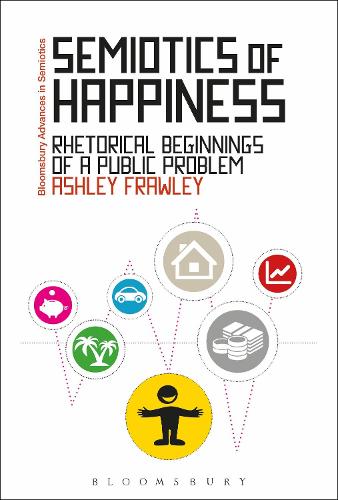
Semiotics of Happiness: Rhetorical beginnings of a public problem
(Hardback)
Available Formats
Publishing Details
Semiotics of Happiness: Rhetorical beginnings of a public problem
By (Author) Ashley Frawley
Bloomsbury Publishing PLC
Bloomsbury Academic
26th February 2015
United Kingdom
Classifications
Professional and Scholarly
Non Fiction
Philosophy: epistemology and theory of knowledge
121.68
Physical Properties
Hardback
240
Width 156mm, Height 234mm
501g
Description
The Semiotics of Happiness examines the rise of 'happiness' (and its various satellite terminologies) as a social and political semiotic, exploring its origins in the US and subsequent spread into the UK and across the globe. The research takes as its starting point the development of discussions about happiness in UK newspapers in which dedicated advocates began to claim that a new 'science of happiness' had been discovered and argued for social and political change on its behalf. Through an in-depth analysis of the written and visual rhetoric and subsequent activities of these influential 'claims-makers', Frawley argues that happiness became a serious political issue not because of a growing unhappiness in society nor a demand 'on the ground' for new knowledge about it, but rather because influential and dedicated 'insiders' took the issue on at a cultural moment when problems cast in emotional terms were particularly likely to make an impact. Emerging from the analysis is the observation that, while apparently positive and light-hearted, the concern with happiness implicitly affirms a 'vulnerability' model of human functioning, encourages a morality of low expectations, and in spite of the radical language used to describe it, is ultimately conservative and ideally suited to an era of 'no alternative' (to capitalism).
Reviews
Of interest to linguists and sociologists alike, this excellent study examines when, how, and why the discourse of happiness came to find a place in British public policy. Documenting the growth of the happiness industry in Britain over the last 25 years, Frawley (sociology and social policy, Swansea Univ., Wales) details the expansion of media and political commentary on collective well-being This book is valuable both as a history of the rise of happiness discourse and research and as an exemplary discussion of the processes involved in the social construction of a problem by key players with financial and social interests at stake. Going beyond the simple documentation of the context, players, and processes involved in the rise of a common cultural symbol, Frawley argues that this problematization of an evocative emotion is directly related to people's loss of belief in progress, collective narratives, and structural solutions. Summing Up: Recommended. Upper-division undergraduates through faculty and professionals. * CHOICE *
A clever, careful dissection of contemporary claims by experts, politicians, and the media that modern societies have a happiness problem. What can I say This book made me happy. -- Joel Best, Professor of Sociology and Criminal Justice, University of Delaware, USA
Ashley Frawley provides a compelling account of the social and political developments that have seen the issue of happiness become a key focus of contemporary social policy. She charts the way in which we now conceptualise a wide range of social problems via the language of happiness and unhappiness. In an intelligent and persuasive manner she alerts us to the need to view the happiness agenda as ultimately being conservative in nature, containing as it does an implicit critique of change, whereby the achievement of psychological equality is presented as a radical alternative to material advancement. Frawleys critique should encourage us to question such a lowering of both individual and societal expectations and she provides us with an intellectual resource with which to do so. -- Ken McLaughlin, Senior Lecturer in the Department of Social Care and Social Work, Manchester Metropolitan University, UK
Amidst a deluge of uncritical outpourings from the media, policy makers and psychologists about the supposedly dire state of the nation's happiness, Ashley Frawley's book offers a forensic analysis of how a self-serving happiness and well-being industry has come to dominate British public policy and debate over the past 20 years. It's an indispensable read for anyone wanting to understand these far-reaching and serious developments. -- Kathryn Ecclestone, Professor of Education, University of Sheffield, UK
The original and provocative insights in Ashley Frawleys Semiotics of Happiness illuminate how the happiness and wellbeing industry is suffused with a morality of low expectations ... Frawley charts in forensic detail the speed with which happiness has been recast as a social problem * Spiked Online *
Of interest to linguists and sociologists alike, this excellent study examines when, how, and why the discourse of happiness came to find a place in British public policy. Documenting the growth of the happiness industry in Britain over the last 25 years, Frawley (sociology and social policy, Swansea Univ., Wales) details the expansion of media and political commentary on collective well-being. She argues that modern insider "claims-makers," with the aid of the expert and the scientist, helped move happiness, with even more speed, into the public realm after 2003 and into discussions of national public policy. This culminated in political change with the establishment, in 2010, of Britain's Measuring National Well-Being program. This book is valuable both as a history of the rise of happiness discourse and research and as an exemplary discussion of the processes involved in the social construction of a problem by key players with financial and social interests at stake. Going beyond the simple documentation of the context, players, and processes involved in the rise of a common cultural symbol, Frawley argues that this problematization of an evocative emotion is directly related to people's loss of belief in progress, collective narratives, and structural solutions. * CHOICE *
Author Bio
Ashley Frawley, Lecturer in Sociology and Social Policy, Swansea University, Wales
